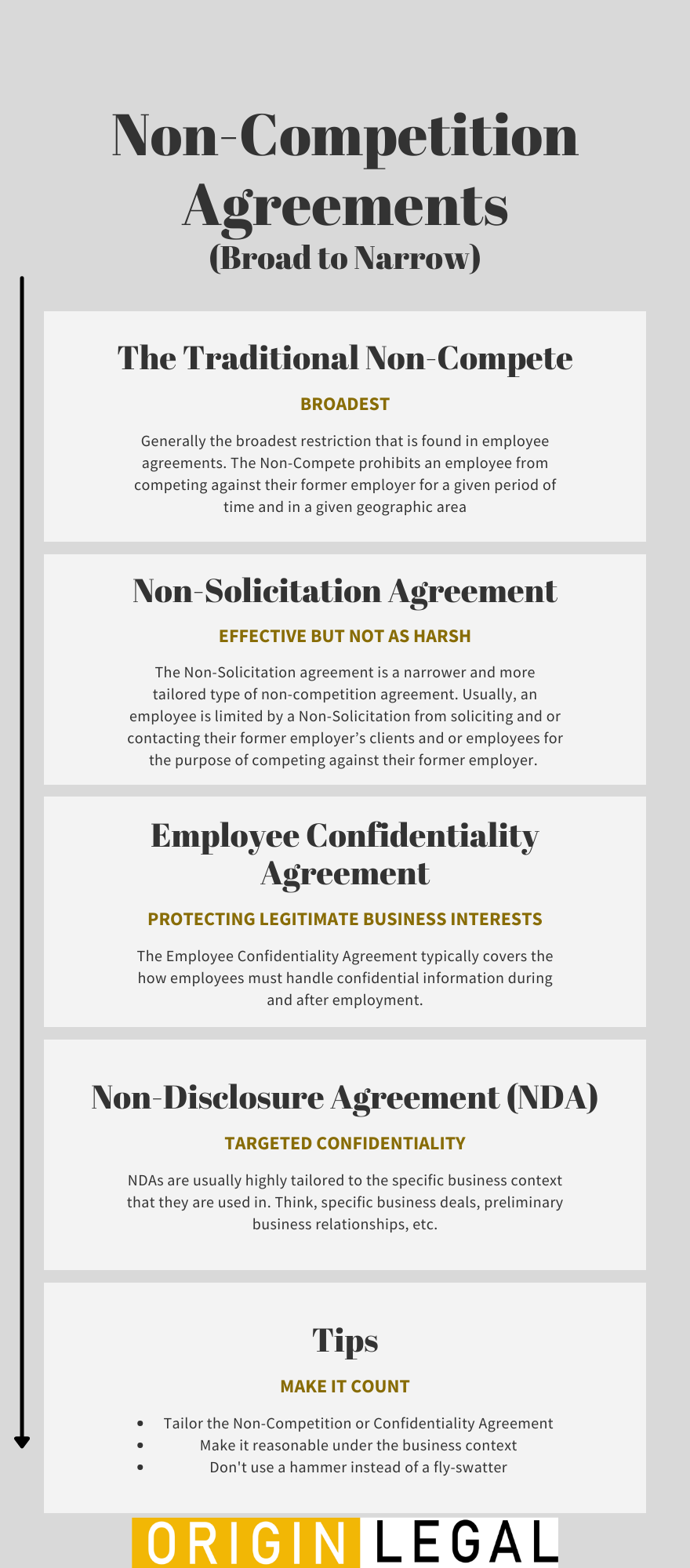Non-Compete Agreements in Utah (2023)
Utah Non-Compete Law
What happens when your employee goes to work for a competitor? This type of situation occurs regularly in the course of business. Employees of all kinds come and go, working for one employer then switching to a competitor because of a better offer, or moving to a different industry entirely. Properly using non-compete or non-solicitation agreements can help protect an employer’s legitimate business interests. Employees often have access to confidential information, trade secrets, they have grown the goodwill of the business, or they have personal relationships with clients.
A non-compete agreement in Utah must be:
Supported by consideration.
Be negotiated in good faith.
Protect the legitimate interests of the business.
Take into consideration the nature of the employee’s services.
Reasonable in its time and geographic limitations. (In Utah, traditional Non-Competes are limited by statute to a period no greater than one year).
Utah Non-Compete Agreement Key Elements
Non-competes are contractual agreements that can help you fairly protect your legitimate business interests when an employee decides to leave by placing a range of limitations on their activities that may harm your business.
Courts in Utah use a series of factors to determine whether a Non-Compete is enforceable or whether it is void as an overbroad restriction on competition. Typically, courts will look at the following:
Whether the Non-Compete is supported by consideration.
Whether there was bad faith in the negotiation of the Non-Compete.
Whether the Non-Compete is necessary to protect legitimate business interests such as trade secrets, confidential information, goodwill of the business, or significant investments in the training or education of the employee.
Whether the services of the employee are special, unique, or extraordinary.
Whether the time and geographic limitations are reasonable (In Utah, traditional Non-Competes are limited by statute to a period no greater than one year)
The person enforcing the non-compete must show that the restrictions are necessary and reasonable in the context of the business and employment to protect its legitimate business interests.
Looking to start a business and hire employees? See my article on Starting a Utah LLC (2023) for a basic guide on getting your LLC up and running.
Types of Non-Compete Agreements
Traditional Non-Compete
Most employers and businesses are familiar with the Non-Compete agreement. This is generally the broadest restriction that is found in employee agreements. The Non-Compete simply prohibits an employee from competing against their former employer for a given period of time and in a given geographic area. Even though this is arguably the simplest type of non-competition agreement, it is also the one that is probably the most difficult to enforce by law.
Courts are generally reluctant to enforce broad non-competes because they are often seen as an unfair and overbroad restriction on fair competition.
In Utah, traditional Non-Competes are limited by statute to a period no greater than one year.
Non-Solicitation Agreement
The Non-Solicitation agreement is a narrower and more tailored type of non-competition agreement. Usually, an employee is limited by a Non-Solicitation from soliciting and or contacting their former employer’s clients and or employees for the purpose of competing against their former employer.
Utah Non-Solicitation agreements are generally easier to enforce as they are more limited in scope and are arguably more reasonable and tailored than a Non-Compete.
Non-Disclosure Agreements (NDAs) and Employee Confidentiality Agreements
The Non-Disclosure Agreement and Employee Confidentiality Agreement typically covers the how employees must handle confidential information during and after employment. While not usually considered a non-compete, these agreements aim to protect similar legitimate business interests. The post employment restrictions imposed are usually focused on preventing the disclosure of confidential information by the former employee.
This agreement is usually enforceable as the limitations placed on the employee are generally limited to preventing disclosure of confidential information, and not expressly limiting competition.
Carefully Tailored Non-Competition Agreements
Carefully tailoring a non-competition or confidentiality agreement to the specific business context and role of the employee is essential to its enforceability and effectiveness. In addition to the factors that courts use to analyze the validity of a non-compete agreement, there may be additional employment law considerations in these types of agreements.
If you have questions about non-compete agreements in Utah, non-disclosure agreements, or confidentiality and Utah non-solicitation agreements, please contact me for a free consultation.
References:

